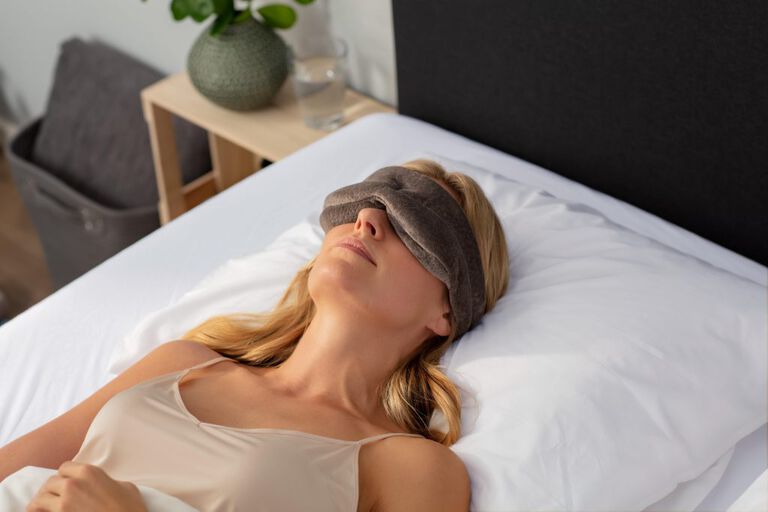SLEEP TALKING: CAUSES & TREATMENT
A type of sleep disorder, sleep talking is the act of speaking during sleep, sometimes referred to as somniloquy. As a parasomnia – an abnormal behaviour that takes place during sleep – sleep talking is actually quite common, but tends to occur more frequently in men and children. It may co-exist with other parasomnias such as night terrors, sleepwalking, and sleep apnoea.

Sleep talking can be defined by stage and severity. In stages 1 and 2, sleep is not that deep, so the sleep talker’s speech may be easy to understand. They may have whole conversations that make sense, even if they are entirely unaware of talking. In stages 3 and 4, the sleep talker is in a deeper sleep, so their speech will be harder to understand, and may come out as moans or gibberish.
As for severity, sleep talking can be rated mild, moderate or severe. Mild sleep talking may occur a few times a month, moderate sleep talking may happen more than once a week causing mild disturbance to a bed partner, and severe sleep talking occurs every night, causing pronounced interruption in the quality of sleep of other people within earshot.
While generally considered harmless, sleep talking can certainly be a nuisance, especially if it’s causing problems for other people in the house. In this post, we’re going to look at the various potential sleep talking causes, as well as sleep talking treatment, helping everyone in the house to get better sleep.
WHAT ARE THE CAUSES OF SLEEP TALKING?
Sleep talking is one of the more common sleep disorders, with as many as half of all children aged 3 to 10 affected by it*. While it is less common in adults – around 5% of people continue to sleep talk into adulthood – it is thought that that sleep talking may be genetic**. Aside from that however, little is known about this sleep disorder.
According to the National Sleep Foundation, sleep talking may be brought on by stress or depression, by sleep deprivation or daytime sleepiness, or by fever or substances such as certain medications and alcohol. Sleep talking may occur alongside other sleep disorders, such as sleep apnoea, nightmares, confusional arousals, and REM sleep behaviour disorder.
And sleep talking meaning? For those looking for meaning behind their own or their loved one’s sleep talk, it’s likely there is no meaning at all to the words or sentences uttered during sleep. Modern sleep science agrees that sleep talking is not a product of a conscious or rational mind, so just as with dreams, sleep talking may only make sense within that time and space of sleep.
SLEEP TALKING: TREATMENT
Sleep talking – like certain other sleep disorders – is generally considered harmless. However, it can cause upset for both the sleep talker and others in the household. For the sleep talker, they may be embarrassed by their condition, and may not want to disturb their partner or roommate. Sleep talking in children can worry some parents, especially if their child shouts during sleep.
In general, treatment for sleep talking is not necessary. However, if sleep talking is severe or persists over a long period of time, it may be a good idea to consult a GP or sleep specialist. There may be an underlying medical explanation for sleep talking that may benefit from medical treatment, such as anxiety or stress, or an undiagnosed sleep disorder.
As there may be certain triggers for sleep talking, sufferers could try to pinpoint these and avoid them if possible. This may mean reducing stress, following a regular sleep schedule, getting the proper amount of sleep and avoiding heavy meals and alcohol. Partners and roommates may find earplugs and white noise reduces the interruptions caused by sleep talking through the night.
HOW TO KNOW IF YOU SLEEP TALK?
In general, sleep talking only becomes a problem when it interferes with the quality of sleep of the sleep talker or those around them. If your partner is a deep sleeper or you sleep alone, you may not even know you sleep talk. If you’re interested to find out if you sleep talk, you could use a sleep talking app to record yourself overnight.
Want to find out more about other common sleep disorders? Check out our blog for informative posts on conditions such as sleep walking, sleep terrors, restless legs syndrome and sleep paralysis.
* https://www.webmd.com/sleep-disorders/talking-in-your-sleep#1
** https://www.webmd.com/sleep-disorders/talking-in-your-sleep#1
Feel it for yourself
Find a TEMPUR store or Stockist and try out our range of mattresses for yourself

SIGN UP FOR THE NEWSLETTERS!
By signing up, you agree to receive TEMPUR Australia’s products, services, news, reviews and promotions by emails. For more information on how we process your personal data, please refer to our Privacy Policy.



